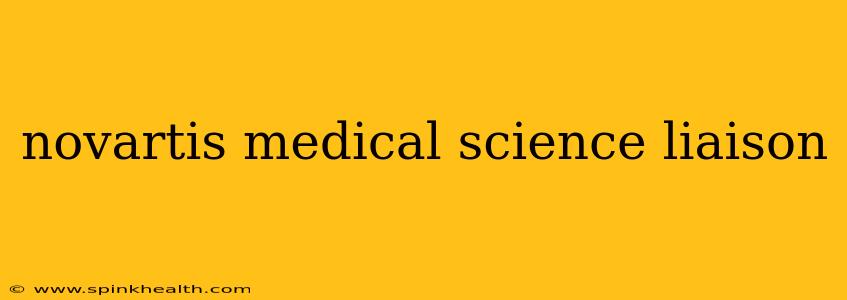The pharmaceutical industry isn't just about churning out pills; it's about improving lives. And at the heart of that mission are individuals like Medical Science Liaisons (MSLs), the unsung heroes connecting cutting-edge research with the needs of healthcare professionals. This article delves into the world of a Novartis MSL, exploring their daily tasks, the skills they need, and the impact they make.
Imagine a world where groundbreaking research stays confined within laboratory walls, never reaching those who could benefit most. That's where the Novartis MSL steps in – a critical link between the scientific advancements within Novartis and the medical community. Their day isn't scripted; it's a dynamic blend of scientific exchange, relationship building, and strategic thinking.
What Does a Novartis Medical Science Liaison Do?
The role of a Novartis MSL is multifaceted. They're not salespeople; their focus is on providing unbiased medical information and fostering collaborative relationships with key opinion leaders (KOLs) in the healthcare field. A typical day might involve:
- Medical Information Exchange: Spending time with physicians, researchers, and other healthcare professionals, discussing clinical data, research findings, and the latest advancements in Novartis' therapeutic areas. This might involve presenting data at grand rounds, participating in advisory boards, or simply engaging in one-on-one discussions.
- Scientific Engagement: Participating in medical conferences, congresses, and workshops to stay abreast of the latest scientific breakthroughs and network with experts. This constant learning is crucial for remaining at the forefront of medical knowledge.
- Strategic Planning: Identifying key unmet needs within specific therapeutic areas and developing strategies to address them, often working closely with internal teams at Novartis.
- Internal Collaboration: Working closely with other departments within Novartis, such as clinical development, regulatory affairs, and marketing, to ensure seamless communication and alignment of strategies.
What Skills Does a Novartis MSL Need?
Becoming a Novartis MSL requires a unique blend of scientific expertise, communication prowess, and strategic thinking. Here are some essential skills:
- Advanced Scientific Knowledge: A deep understanding of medical science, pharmacology, and relevant therapeutic areas is paramount. A PhD, PharmD, or MD is typically required.
- Exceptional Communication Skills: The ability to articulate complex scientific information clearly and concisely to a diverse audience is crucial. This includes both written and verbal communication.
- Relationship Building: MSLs must be adept at building and maintaining strong, trusting relationships with healthcare professionals. This requires strong interpersonal skills and a genuine interest in collaborating with others.
- Strategic Thinking: MSLs need to be able to analyze complex data, identify trends, and develop strategic plans to effectively address unmet medical needs.
What is the Career Path for a Novartis MSL?
The MSL role is a stepping stone to several leadership positions within Novartis and the broader pharmaceutical industry. Many MSLs progress to roles such as:
- Medical Affairs Leadership Roles: Managing teams of MSLs, overseeing strategic initiatives, and contributing to the overall medical strategy of the company.
- Clinical Development: Leveraging their deep scientific knowledge to contribute to the design and execution of clinical trials.
- Regulatory Affairs: Using their expertise to navigate the complex regulatory landscape of the pharmaceutical industry.
How Do I Become a Novartis Medical Science Liaison?
The path to becoming a Novartis MSL is competitive. Typically, it requires:
- Advanced Degree: A PhD, PharmD, or MD in a relevant scientific field.
- Relevant Experience: Several years of experience in a related field, such as clinical research, medical affairs, or academia.
- Strong Communication and Interpersonal Skills: Proven ability to effectively communicate complex information and build relationships.
- Networking: Building a network of contacts within the healthcare industry is essential.
What are the key responsibilities of a Medical Science Liaison?
The core responsibilities revolve around providing scientific expertise and building relationships. This includes:
- Disseminating scientific information: Sharing data on Novartis products and therapies with healthcare professionals.
- Identifying unmet medical needs: Working to understand the challenges faced by physicians and patients.
- Providing medical education: Educating HCPs on the latest research and treatment options.
- Contributing to medical strategy: Informing Novartis's overall medical strategy.
What is the difference between an MSL and a sales representative?
This is a crucial distinction. MSLs focus on providing unbiased medical information and building relationships, whereas sales representatives are focused on promoting and selling products. MSLs don't have sales quotas and prioritize scientific exchange over sales targets.
The world of a Novartis MSL is one of constant learning, collaboration, and meaningful impact. It's a career for those passionate about science, dedicated to improving patient care, and driven to make a difference in the lives of others. The journey to becoming an MSL is challenging, but the rewards are immeasurable.

